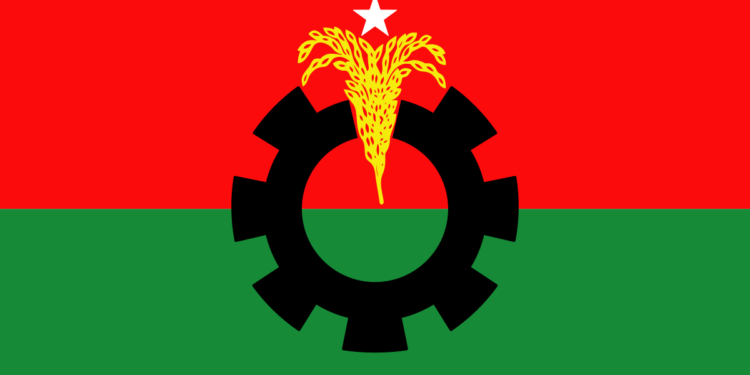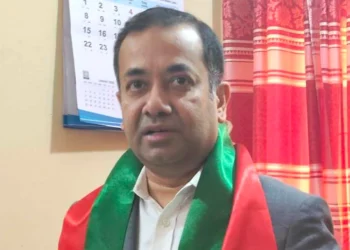UNB- BNP adopts anti-India stance post-Hasina government, citing failed ties and anti-Bangladesh rhetoric, say senior leaders.
After the fall of Sheikh Hasina’s government, the BNP’s attempts to improve ties with India apparently failed, prompting the party to adopt a stronger, openly anti-India stance, according to senior party leaders.
They said their party had to take this stance to retain its popularity, particularly in the face of widespread anti-Bangladesh propaganda and provocative statements from some Indian politicians and media outlets.
The BNP leaders said anti-Indian sentiment is growing in Bangladesh as Sheikh Hasina took shelter there escaping the country in the face of a mass uprising while the people believe that India is actively trying to create chaos in the country through various ways, including the use of the religion card.
“In such a situation, as the major and popular political party, the BNP cannot remain silent about what India is doing and the incidents happening there. If we stay silent, people will misunderstand us, and we may lose popularity as the Islamic party will take advantage of it. So, we’ve become vocal against India’s aggression,” said a BNP standing committee member, speaking on the condition of anonymity.
He said the attack on the Bangladesh mission in Agartala, the desecration of the national flag, anti-Bangladesh statements by Indian leaders, and the ongoing propaganda and misinformation spread by Indian media have sparked strong resentment both among the people and within the BNP.
“So, the anti-India position within the BNP has strengthened, prompting the party high command to instruct its three associate bodies to announce protest programmes against Indian aggression,” the BNP policymaker said.
On Sunday, three BNP associate bodies –Jatiyatabadi Jubo Dal, Swechchasebak Dal, and Chhatra Dal—staged a march towards the Indian High Commission and submitted a memorandum there to register their protest against the recent anti-Bangladesh incidents in the neighbouring country and demanding an end to misinformation about Bangladesh and ensuring the safety of Bangladeshi missions in India.
They will also stage a long march towards Agartala from Dhaka on Wednesday to protest against Indian aggression.
Another BNP standing committee member said their party took the initiative to improve ties with the Indian government and political parties after the ouster of the Awami League regime, but they have yet to receive any reciprocal response from India.
He said Indian High Commissioner to Bangladesh, Pranay Verma, met with their party leaders, including Secretary General Mirza Fakhrul Islam Alamgir on September 22, during which they outlined ways to bring positivity and strengthen the relationship between Indian political parties and the BNP as a political entity.
“We also tried to send a message to the Indian authorities to establish relations with the people of Bangladesh and the major political parties, urging them to move away from their exclusive ties with the Awami League. But we’re surprised that India has not budged even an inch from its position,” the BNP leader said.
He said they still want to maintain good relations with the Indian government, political parties and people. “Through our current stance, we mainly aim to exert pressure on India to reconsider its anti-Bangladesh position and exclusive ties with the Awami League. If they change their stance, we will reciprocate, as we believe that friendship with India is crucial for maintaining regional stability.”
The BNP leader said their party’s acting chairman Tarique Rahman has been cautiously avoiding anti-Indian remarks as he is willing to mend ties with the neighbouring country and resolve past misunderstandings. “But now, it depends on India. If they don’t come forward, we will have to work out our strategy focusing on other regional partners, including China.”
He said although China supported the Sheikh Hasina government, it has already changed its position and is showing interest in warming ties with the BNP.
The BNP leader, however, said as a moderate democratic party, the BNP does not want to be either an anti-Indian or pro-Indian party. “BNP will remain open to fostering a friendly relationship with India through diplomatic efforts, while also being vocal against India’s negative activities.”
While exchanging views with local journalists in London on Saturday, BNP Secretary General Mirza Fakhrul Islam Alamgir said a political party devises its strategy based on the prevailing circumstances and ground realities and the interests of the country.
He said BNP is now vocal against India because some political leaders in the neighbouring country and its media are unfairly spreading false propaganda against Bangladesh to destabilize the country and the interim government.
When asked about Bangladesh’s foreign policy towards India if BNP forms the government, he replied, “Our policy with India will depend on our needs and interests. But we won’t tolerate any assault on our sovereignty… We won’t accept any interference in our internal affairs.”
BNP standing committee member Gayeshwar Chandra Roy said India should try to understand the pulse of the Bangladeshi people and adjust its position accordingly.
He said India has already strained relations with Nepal, Bhutan, the Maldives, and Pakistan. “Now they are turning against Bangladesh. India must consider how they will move forward alone if they lose relations with all the countries in South Asia.”
BNP Standing Committee member Iqbal Hasan Mahmud Tuku said India is interfering in the internal affairs of Bangladesh. “They’re still backing Sheikh Hasina. The Indian politicians’ statements and their media reports are spreading a kind of hatred against Bangladesh. The people of Bangladesh are united against this hegemonic attitude of India.”
Reports: UNB




















